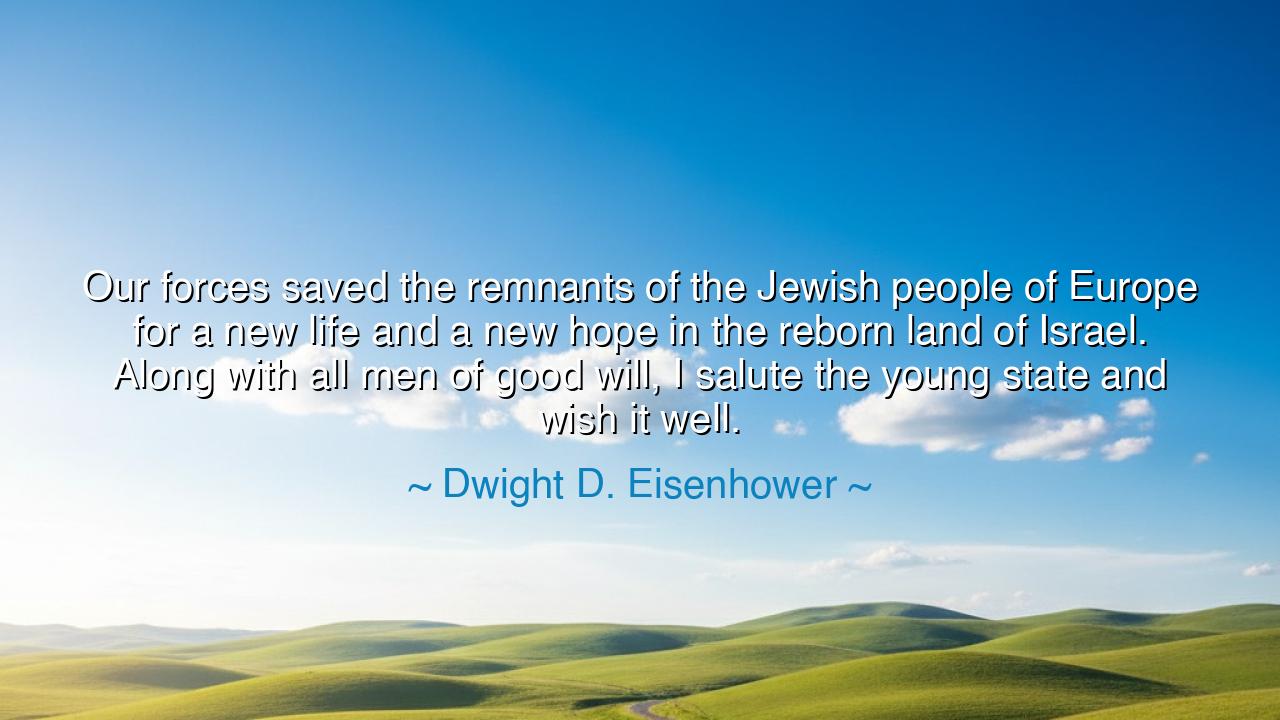
Our forces saved the remnants of the Jewish people of Europe for
Our forces saved the remnants of the Jewish people of Europe for a new life and a new hope in the reborn land of Israel. Along with all men of good will, I salute the young state and wish it well.






"Our forces saved the remnants of the Jewish people of Europe for a new life and a new hope in the reborn land of Israel. Along with all men of good will, I salute the young state and wish it well." – Dwight D. Eisenhower
In this solemn declaration, Dwight D. Eisenhower, a soldier of freedom and a witness to humanity’s darkest hour, spoke not only as a leader but as a guardian of history. His words carry the weight of centuries — of suffering, of deliverance, and of rebirth. When he said that the remnants of the Jewish people were “saved,” he spoke of those who had endured the unendurable — who had walked through the valley of death and yet refused to let the light of their spirit be extinguished. His message is both a tribute and a prophecy: that from the ashes of horror could arise a new life and a new hope.
The origin of this quote lies in the aftermath of World War II, when Eisenhower, as Supreme Commander of the Allied Forces, oversaw the liberation of the concentration camps. He saw with his own eyes the skeletal survivors of the Holocaust, the walking testaments of cruelty and endurance. What he witnessed there marked him forever. He ordered that every atrocity be photographed and documented, for he feared that one day men might deny what had happened. And yet, even in the midst of such devastation, Eisenhower looked beyond despair — he looked toward renewal. He saw in those who survived not merely victims, but the seeds of a future that refused to die.
That future found its home in the reborn land of Israel. After two thousand years of exile and persecution, the Jewish people reclaimed their ancient soil — a return not just of bodies, but of destiny. Eisenhower’s salute to this young state was not political alone; it was moral, spiritual, and profoundly human. For he understood that Israel’s rebirth symbolized something greater than nationhood — it was the triumph of life over annihilation, hope over despair, and faith over the deepest night of history. It was proof that even when humanity shatters, it can rebuild itself through courage and purpose.
History offers us an image to embody this truth. When the first ships carried Holocaust survivors to the shores of Haifa, they did not arrive as conquerors but as resurrected souls. They built with trembling hands, planted trees where deserts lay barren, and turned grief into creation. In them lived the essence of Eisenhower’s words — a people reborn, not through conquest but through remembrance and resolve. They carried within them the sacred knowledge that to survive is not enough; one must also rebuild, and in rebuilding, give meaning to the suffering endured.
Eisenhower, though a man of war, spoke here as a man of peace. He recognized that salvation is not complete until it gives rise to hope. The Allied forces had done more than liberate camps — they had given humanity a chance to restore its moral soul. His salute to “all men of good will” was a reminder that goodness must never belong to one people alone; it is the shared duty of all who call themselves human. To stand with the oppressed, to defend life where it is threatened — this is the eternal command of conscience.
There is also humility in his words. Eisenhower did not claim victory as his own; instead, he honored the enduring strength of those who had suffered. He saw that the human spirit, once crushed, can still rise with greater power than before. His blessing upon Israel was not just for a nation, but for every soul that dares to begin anew after tragedy — for every heart that believes life can emerge from ruin.
So, my children, learn from this: that even in the ashes of devastation, the seeds of renewal lie hidden. When the world seems broken beyond repair, remember that hope is the most defiant force of all. It may falter, but it never dies. Honor the memory of those who perished by living fully, by defending justice wherever it trembles, and by building — always building — toward peace.
Lesson: The legacy of Eisenhower’s words teaches us that remembrance and rebuilding are sacred duties. To save life is not enough; one must nurture it, protect it, and let it bloom into hope. When fear whispers that humanity has failed, let your deeds answer with compassion, courage, and truth. For as long as hope is reborn, the spirit of the living and the memory of the dead will walk together — undefeated.






AAdministratorAdministrator
Welcome, honored guests. Please leave a comment, we will respond soon